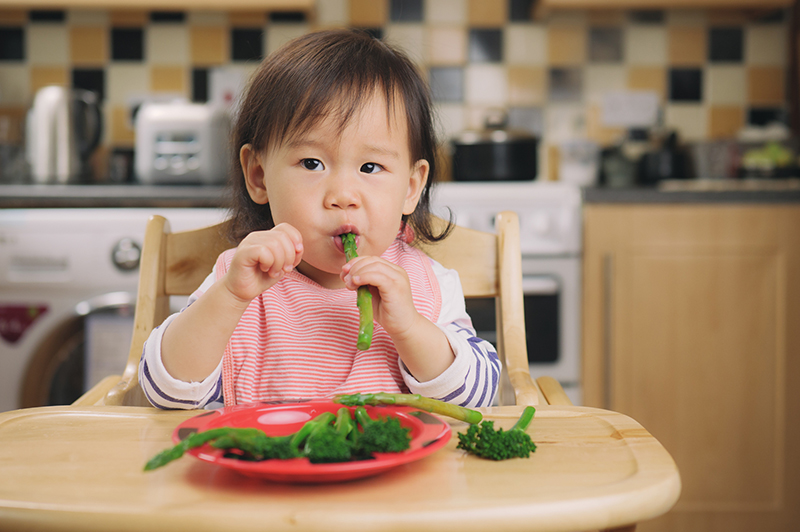Families For Life | Nutrition for Your Toddler

Eating well starts at a young age. Here is what every parent should know.
Nutrition for your 1-2 year old baby
At this age, your child’s digestive system should be mature enough for him to eat the same food as you. Ensure that his food is prepared with a reasonable amount of salt, sugar and/or oil for taste and variety. He should also drink enough water and get enough fibre (from fruits, vegetables and whole-grains) to prevent constipation. You can continue to give him breast milk. If he has been drinking formula milk, it is fine to switch to whole milk. Between 2-5 years of age, you may switch him to low-fat milk.
Your child has been growing rapidly, tripling his birth weight in a year. Now his rate of growth will slow down and his appetite may lessen. This is normal. Remember that his tummy size is still small. Do not force him to eat more than he needs. It is best to offer smaller portions of healthy food more often and let him choose how much to eat.
What and how much to eat
As a parent, you model food preferences and play an important role in setting a good foundation for your child’s dietary habits. Eating habits can influence the risk of developing lifestyle-related diseases such as obesity, diabetes, high blood pressure and high blood cholesterol. There is growing evidence that food preferences and eating habits developed from childhood can influence a child’s eating habits when he becomes an adult. Hence it is important to help your child make better food choices now. This will have a big impact on his health and quality of life later.
All you have to do is to:
be a good role model
ensure that he has a balanced diet with a variety of food
be creative when preparing and presenting food.
Offer your child a variety of food from the four main food groups to get all the nutrients he needs.
Healthy eating tips:
Serve nutrient-rich food so that every single mouthful packs a load of nutrients for your child. Even if he does not eat much, you know that at least whatever he has eaten is nutritious.
Give him healthy snacks such as wholemeal bread, plain biscuits, yoghurt or fruit. Look out for food items with the Healthier Choice Symbol or Healthier Snack Symbol.
Do not be too strict with fat. Your child still needs it to fuel his higher energy levels. Low-fat food and diets are not suitable for children below the age of 2 years.
Avoid sweetened drinks. Satisfy your child's thirst with water.
Encourage self-feeding with supervision. Make sure the food is not a choking hazard. Do not allow him to run around with food in his mouth.
Start with smaller portions and refill his plate on request.
Your child may be sick of eating the same food all the time. Hence be patient if he refuses to eat a certain food. Try alternatives, like spinach instead of broccoli. If he is still resistant, take a break from that food and try again after one week.
Include a variety of colourful food in your child's meal and cut food into interesting shapes such as star-shaped carrots to attract his attention.
Do not use food as a reward.
As an example, plain full cream milk is graded C under the Nutri-Grade grading system due to its higher saturated fat content compared to low fat milk. However, for 1-2 year olds, plain full cream milk still meets the dietary requirements of adequate fat, protein, vitamins and minerals which are essential for their growth and development.
Video: Speaking of Children - Healthy Eating Habits for Children
Wondering how you're going to get your kids started on their fruits and vegetables even though you know they really want those chicken nuggets? Check out Dr Mary Chong's pointers on instilling healthy eating habits in your children from day one!
Explore more
Contributed by:
Health Promotion Board's Parent Hub